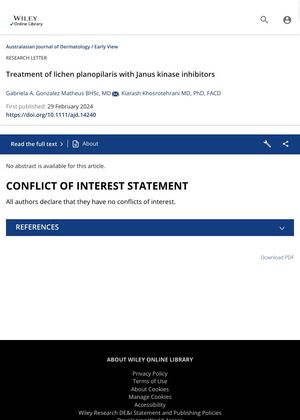Treatment of Lichen Planopilaris With Janus Kinase Inhibitors
February 2024
in “
Australasian journal of dermatology
”

TLDR Janus kinase inhibitors may help treat lichen planopilaris.
The research letter discusses the treatment of lichen planopilaris (LPP) using Janus kinase (JAK) inhibitors. The authors, Gabriela A. Gonzalez Matheus and Kiarash Khosrotehrani from the Queensland Institute of Dermatology, explore the efficacy of JAK inhibitors in managing this condition. Although no abstract is available, the letter likely reviews existing literature and case studies, such as the use of tofacitinib and baricitinib, which have shown promise in treating LPP. The authors declare no conflicts of interest.







